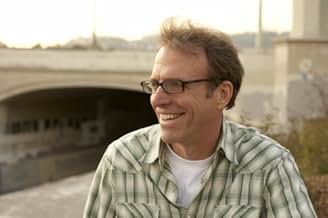IMDb-BEWERTUNG
7,4/10
28.889
IHRE BEWERTUNG
Kirby Dicks Exposé über die amerikanische Filmbewertungsstelle.Kirby Dicks Exposé über die amerikanische Filmbewertungsstelle.Kirby Dicks Exposé über die amerikanische Filmbewertungsstelle.
- Regie
- Drehbuch
- Hauptbesetzung
- Auszeichnungen
- 4 Gewinne & 3 Nominierungen insgesamt
Clark Baker
- Self - Private Investigator
- (as Clark)
Empfohlene Bewertungen
Since the Hays Code, filmmakers have had a lot more freedom over the content of their films. However, the MPAA ratings board still does exercise a certain de facto censorship power. Most people do not realize this.
"This Film is not Yet Rated" exposes the arbitrariness, secrecy, and bias of the MPAA ratings board and makes the viewer question why movies receive the ratings they do.
Kirby Dick puts together a nice cross-section of directors and "talking heads" who discuss the MPAA ratings board's biases when it comes to realism, sex, violence, gay themes, and other taboo issues in films.
Dozens of major directors have had problems with the MPAA ratings board - they either received the NC-17 (or the old "X") rating or had to cut their films to meet the requirements of the ratings board. Some examples are: Kubrick, Tarantino, Lynch, Woo, Friedkin, Peckinpah, Aronofsky, and countless others.
This film exposes the fact that the ratings board is made up of people who are given NO criteria and NO training for rating films, so they basically use their own personal (and obviously heavily biased) judgments to decide what rating a particular movie should receive.
This is an important film because so few people realize how movies are rated in the U.S. Even fewer realize how problematic (biased, anti-democratic, non-transparent, not accountable) our system is.
It is also well put together, so it is easier to watch than most documentaries.
I would have liked to have heard more comparisons between the U.S. rating system and others worldwide, something that was only briefly touched upon.
9 out of 10
"This Film is not Yet Rated" exposes the arbitrariness, secrecy, and bias of the MPAA ratings board and makes the viewer question why movies receive the ratings they do.
Kirby Dick puts together a nice cross-section of directors and "talking heads" who discuss the MPAA ratings board's biases when it comes to realism, sex, violence, gay themes, and other taboo issues in films.
Dozens of major directors have had problems with the MPAA ratings board - they either received the NC-17 (or the old "X") rating or had to cut their films to meet the requirements of the ratings board. Some examples are: Kubrick, Tarantino, Lynch, Woo, Friedkin, Peckinpah, Aronofsky, and countless others.
This film exposes the fact that the ratings board is made up of people who are given NO criteria and NO training for rating films, so they basically use their own personal (and obviously heavily biased) judgments to decide what rating a particular movie should receive.
This is an important film because so few people realize how movies are rated in the U.S. Even fewer realize how problematic (biased, anti-democratic, non-transparent, not accountable) our system is.
It is also well put together, so it is easier to watch than most documentaries.
I would have liked to have heard more comparisons between the U.S. rating system and others worldwide, something that was only briefly touched upon.
9 out of 10
The film rating system in this country is governed by a secret panel created by the major film studios more than 35 years ago. Since its inception the MPAA ratings board has functioned as a sort of 'black box' where movies go in one end and a rating comes out the other, with absolutely no transparency or public accountability of the process.
The MPAA rating system is publicly proclaimed to be merely a voluntary industry system that nobody is 'required' to follow. Unfortunately the reality of the movie industry is entirely divorced from these innocuous proclamations. The rating placed on a film largely determines who gets to see it in a theater, and what sort of publicity for the movie will be accepted by television and newspapers. An NC-17 basically guarantees that only the small sliver of the public with access to art house cinemas will ever sit down in a theater to watch the film, and that there will be virtually no way to promote the film to the public.
So, in the real world, the MPAA ratings board wields considerable unchecked power over the film industry. Since the organization is funded and sustained by the major studios, that influence becomes particularly problematic when applied to independent productions. It would be not unlike a small, local merchant having to go to board set up by Wal-Mart and Target to get approval for what he can put out on his shelves.
Kirby Dick approaches this subject with humor, insight, and tenacity. He undertakes to blow the lid off of the black box of the MPAA rating system. In the process he creates a narrative filled with both information and humor. While I will leave his methods as a surprise for the viewer, suffice it say they are both unconventional and effective.
The interspersing of interviews with independent filmmakers who have been forced to do battle with the MPAA to get their movies seen, provides an excellent counterpoint to Dick's quest to expose the star chamber like proceedings of the rating board to the light of day. As well, his side-by-side comparisons of similar films, one receiving an R rating and the other an NC-17, is illustrative of the particular biases present on the ratings board.
If you care deeply about he art of film, This Film Is Not Yet Rated is a must-see. On the other hand if you just want to learn a little something and have a good laugh, this is a good pick for you too.
The MPAA rating system is publicly proclaimed to be merely a voluntary industry system that nobody is 'required' to follow. Unfortunately the reality of the movie industry is entirely divorced from these innocuous proclamations. The rating placed on a film largely determines who gets to see it in a theater, and what sort of publicity for the movie will be accepted by television and newspapers. An NC-17 basically guarantees that only the small sliver of the public with access to art house cinemas will ever sit down in a theater to watch the film, and that there will be virtually no way to promote the film to the public.
So, in the real world, the MPAA ratings board wields considerable unchecked power over the film industry. Since the organization is funded and sustained by the major studios, that influence becomes particularly problematic when applied to independent productions. It would be not unlike a small, local merchant having to go to board set up by Wal-Mart and Target to get approval for what he can put out on his shelves.
Kirby Dick approaches this subject with humor, insight, and tenacity. He undertakes to blow the lid off of the black box of the MPAA rating system. In the process he creates a narrative filled with both information and humor. While I will leave his methods as a surprise for the viewer, suffice it say they are both unconventional and effective.
The interspersing of interviews with independent filmmakers who have been forced to do battle with the MPAA to get their movies seen, provides an excellent counterpoint to Dick's quest to expose the star chamber like proceedings of the rating board to the light of day. As well, his side-by-side comparisons of similar films, one receiving an R rating and the other an NC-17, is illustrative of the particular biases present on the ratings board.
If you care deeply about he art of film, This Film Is Not Yet Rated is a must-see. On the other hand if you just want to learn a little something and have a good laugh, this is a good pick for you too.
A look into the mysterious organization that decides what rating a film is given. And all sorts of other issues/arguments that are created because of it. Numerous actors, directors, producers, former MPAA raters and critics share their thoughts on the good and bad of the highly secretive organization.
I have always found "rating reasons" funny and often absurd, which is why I make my own when writing these things. I have also always liked to look into second opinion on things so maybe whoever reads my little IMDb reviews will get that from them. Since, the often disturbing fact for film makers is the rating is something they have to live with and discussing it with the people who decided it is virtually not an option. And that ultimately decides what theaters decided to show it and how much, which is essentially how films money.
The reason as many of you know for the infamous NC-17 rating is sexual content, especially if it is explicit, and that is basically the focus of this film. Which is both good and bad. Good, because they do a pretty good job comparing R-rated and NC-17 rated sex scenes which are not that different. But bad, because the issue of violence (in my opinion the most potentially objectionable thing shown in film) is attended to on a small scale. There are violent PG-13 movies (Ah-nuld's "The 6th Day" for one) which include bone breaking, dismemberment, and you get the picture. While on the other side you have R-rated movies with really minimal or much more accurate depiction of violence (Michael Mann's "Heat" for one). Yet violence as entertainment is condoned, but showing kids what violence really looks like is not. Darren Aronofsky and Kevin Smith make the film's only points on violence and it'll leave you wanting for more.
Also there wasn't a comparison to other countries rating system, just a mention that those systems are a little less absurd, which is true if you look at the rating sections on most IMDb film profiles, but some thought here would have been invaluable to this film's argument.
However, this remains a pleasantly fresh documentary that many, but mainly John Waters (haha), have been waiting for. 8/10
Not Rated, contains: sexual material and some violent clips - There are many clips of sex scenes shown, but are shown and discussed from a critical perspective. The few violent scenes are discussed in the same manner. So bring your kids! They'll finally know what "it's not for you" means.
I have always found "rating reasons" funny and often absurd, which is why I make my own when writing these things. I have also always liked to look into second opinion on things so maybe whoever reads my little IMDb reviews will get that from them. Since, the often disturbing fact for film makers is the rating is something they have to live with and discussing it with the people who decided it is virtually not an option. And that ultimately decides what theaters decided to show it and how much, which is essentially how films money.
The reason as many of you know for the infamous NC-17 rating is sexual content, especially if it is explicit, and that is basically the focus of this film. Which is both good and bad. Good, because they do a pretty good job comparing R-rated and NC-17 rated sex scenes which are not that different. But bad, because the issue of violence (in my opinion the most potentially objectionable thing shown in film) is attended to on a small scale. There are violent PG-13 movies (Ah-nuld's "The 6th Day" for one) which include bone breaking, dismemberment, and you get the picture. While on the other side you have R-rated movies with really minimal or much more accurate depiction of violence (Michael Mann's "Heat" for one). Yet violence as entertainment is condoned, but showing kids what violence really looks like is not. Darren Aronofsky and Kevin Smith make the film's only points on violence and it'll leave you wanting for more.
Also there wasn't a comparison to other countries rating system, just a mention that those systems are a little less absurd, which is true if you look at the rating sections on most IMDb film profiles, but some thought here would have been invaluable to this film's argument.
However, this remains a pleasantly fresh documentary that many, but mainly John Waters (haha), have been waiting for. 8/10
Not Rated, contains: sexual material and some violent clips - There are many clips of sex scenes shown, but are shown and discussed from a critical perspective. The few violent scenes are discussed in the same manner. So bring your kids! They'll finally know what "it's not for you" means.
Alright, let's just say it right from the start: the MPAA sucks. They make good films turn into films that are hacked up just to fit their 'moral' agenda, and they are the bane of the existence of Hollywood filmmakers. Being from Canada, I have the benefit of a much fairer system, but one that is affected by the MPAA nonetheless. So when a film like This Film is Not Yet Rated comes out, I definitely become interested. And interesting is what this film is.
The documentary is about the NC-17 rating primarily, and the people and groups fighting against it. When it is not showing interviews and clips about the horror stories in trying to get director's films cut to a suitable R or PG-13 rating, it is about director and star Kirby Dick's hired private investigators trying to get the names of the members of the MPAA ratings board.
Watching the film is a bit of an on and off experience.
On because the interviews with directors like Kevin Smith, Atom Egoyan, Jamie Babbit, Matt Stone, and Wayne Kramer are absolutely fascinating to listen to. They talk about the troubles they had with the MPAA, show the "obscene" footage from their films, and even offer some ideas as to how the MPAA can change for the better, rather than completely tear the company up to pieces. All of these clips are excellently edited together, and in some instances, offer some pretty amusing anecdotes. Seeing the offending clips from the films was also interesting, as just simply talking about them would defeat the purpose of the documentary itself (which thankfully, originally got an NC-17 for having the clips in the film).
These interviews also offer a lot of moments talking about the rules of the MPAA itself. Listening to how ridiculous some get can be hilarious, but it is also enlightening. For someone who is into film and only knows the basics of the MPAA, it offers a lot of information on the final process a movie has to go through before it makes it to the theatre. The clips offered a lot more information than I imagined, and they elevate the film greatly.
Another element I liked was showing the hypocrisies of the MPAA, and interview footage of former head Jack Valenti himself. It made the film feel a whole lot more complete, and gave it more of an authentic circular viewpoint. If they had simply just included the viewpoints of the filmmakers, journalists, authors, doctors and lawyers (like I half expected them to show), than they would not have nearly had as much credibility as they end up having. Of course, these moments are practically the funniest in the film, but they still offer plenty of intriguing insights. I think some comparisons to other country's film rating systems probably could have only enlivened this credibility even more.
Where I think the film fails and becomes off is in the almost obsessive search to find out the identity of the MPAA's raters. I understand that it is pivotal to the entirety of the film, but it just drags the film down into depravity and ridiculousness. It shows these moments in an amusing light, but they really are not that funny. They offer a bit too much information in some sequences (like blurring out license plate numbers, but having the private investigator say the numbers anyway), and the payoff just does not feel entirely proper. It does not have the intensity or the postmodern awareness that the interview clips do. They just feel kind of boring, and in some parts, unnecessary. Dick was already exposing the fraudulence and downright deceitful nature of the MPAA. Did he really need to go so far as to expose everything imaginable?
I am unsure of why it the exposing got to me so much, but it just did not feel totally right in a lot of cases. I liked how much dedication Dick and his crew had for the material, but it feels more like two different films than it does one cohesive whole. The information does not become overwhelming in any scene, but it does feel like overkill in some parts. The film is just over ninety minutes long, but it feels like it could have been trimmed. And most of that trimming could have probably come from scenes involving the private investigators. They just are nowhere near as interesting as the insight and horror stories offered in the interviews and film clips.
This Film is Not Yet Rated is an interesting documentary, and it offers a lot of insight that I seriously doubted it would. It is definitely a recommended watch for anyone who is interested in the film-making process, but for anyone else, it may just be something to casually watch part of and then turn off. I will hand it to Dick though. The final product is something I never thought the MPAA would have passed with any rating.
7.5/10.
The documentary is about the NC-17 rating primarily, and the people and groups fighting against it. When it is not showing interviews and clips about the horror stories in trying to get director's films cut to a suitable R or PG-13 rating, it is about director and star Kirby Dick's hired private investigators trying to get the names of the members of the MPAA ratings board.
Watching the film is a bit of an on and off experience.
On because the interviews with directors like Kevin Smith, Atom Egoyan, Jamie Babbit, Matt Stone, and Wayne Kramer are absolutely fascinating to listen to. They talk about the troubles they had with the MPAA, show the "obscene" footage from their films, and even offer some ideas as to how the MPAA can change for the better, rather than completely tear the company up to pieces. All of these clips are excellently edited together, and in some instances, offer some pretty amusing anecdotes. Seeing the offending clips from the films was also interesting, as just simply talking about them would defeat the purpose of the documentary itself (which thankfully, originally got an NC-17 for having the clips in the film).
These interviews also offer a lot of moments talking about the rules of the MPAA itself. Listening to how ridiculous some get can be hilarious, but it is also enlightening. For someone who is into film and only knows the basics of the MPAA, it offers a lot of information on the final process a movie has to go through before it makes it to the theatre. The clips offered a lot more information than I imagined, and they elevate the film greatly.
Another element I liked was showing the hypocrisies of the MPAA, and interview footage of former head Jack Valenti himself. It made the film feel a whole lot more complete, and gave it more of an authentic circular viewpoint. If they had simply just included the viewpoints of the filmmakers, journalists, authors, doctors and lawyers (like I half expected them to show), than they would not have nearly had as much credibility as they end up having. Of course, these moments are practically the funniest in the film, but they still offer plenty of intriguing insights. I think some comparisons to other country's film rating systems probably could have only enlivened this credibility even more.
Where I think the film fails and becomes off is in the almost obsessive search to find out the identity of the MPAA's raters. I understand that it is pivotal to the entirety of the film, but it just drags the film down into depravity and ridiculousness. It shows these moments in an amusing light, but they really are not that funny. They offer a bit too much information in some sequences (like blurring out license plate numbers, but having the private investigator say the numbers anyway), and the payoff just does not feel entirely proper. It does not have the intensity or the postmodern awareness that the interview clips do. They just feel kind of boring, and in some parts, unnecessary. Dick was already exposing the fraudulence and downright deceitful nature of the MPAA. Did he really need to go so far as to expose everything imaginable?
I am unsure of why it the exposing got to me so much, but it just did not feel totally right in a lot of cases. I liked how much dedication Dick and his crew had for the material, but it feels more like two different films than it does one cohesive whole. The information does not become overwhelming in any scene, but it does feel like overkill in some parts. The film is just over ninety minutes long, but it feels like it could have been trimmed. And most of that trimming could have probably come from scenes involving the private investigators. They just are nowhere near as interesting as the insight and horror stories offered in the interviews and film clips.
This Film is Not Yet Rated is an interesting documentary, and it offers a lot of insight that I seriously doubted it would. It is definitely a recommended watch for anyone who is interested in the film-making process, but for anyone else, it may just be something to casually watch part of and then turn off. I will hand it to Dick though. The final product is something I never thought the MPAA would have passed with any rating.
7.5/10.
America is the land of the free, so in order to constrain people to do what you want them to do, you have to let them think it's their choice. How do you do that? You create a completely anonymous committee, supposedly composed of concerned parents, to rate the films that appear and, depending on that rating, they will get more or less media coverage, distribution, target audience size. You also finance this body with the money of the seven largest film studios in the US. This functioning censorship committee is called the MPAA.
The film is highly biased, to a point where it gets a little annoying, but the information contained in it is sound, proved and makes one think about the way public opinion is manipulated, ever so slightly, towards a desired average point of view. If you ever wondered how Americans can seem so ordinary, yet have completely different opinions about the same subjects as any other people, then this movie will answer part of that question. Very insightful is the presentation of the seven major film studios who own 95% of the American film industry, parts of larger conglomerates that own 90% of all mass-media. Also interesting, the role of the clergy in movie rating. Yes, I did say clergy, as in priests. In the appeals commission there are always an episcopalian priest and a catholic one. No other religions get to add their input.
A must see movie, not a conspiracy theory film, but certainly one that is against the system. The system here being the absurd movie rating system of the MPAA.
The film is highly biased, to a point where it gets a little annoying, but the information contained in it is sound, proved and makes one think about the way public opinion is manipulated, ever so slightly, towards a desired average point of view. If you ever wondered how Americans can seem so ordinary, yet have completely different opinions about the same subjects as any other people, then this movie will answer part of that question. Very insightful is the presentation of the seven major film studios who own 95% of the American film industry, parts of larger conglomerates that own 90% of all mass-media. Also interesting, the role of the clergy in movie rating. Yes, I did say clergy, as in priests. In the appeals commission there are always an episcopalian priest and a catholic one. No other religions get to add their input.
A must see movie, not a conspiracy theory film, but certainly one that is against the system. The system here being the absurd movie rating system of the MPAA.
Wusstest du schon
- WissenswertesThe MPAA announced that starting in March of 2007, it will change their policy and allow filmmakers to cite other film's ratings as comparison. The MPAA will also provide information about the demographics of its board.
- Zitate
John Waters: I also heard on 'A Dirty Shame' - and I have no proof of this - that there were doctors involved... and that some of the kinkier terms, like felching and stuff, that they explained to the MPAA what felching meant. Now, I would like to have heard that because felching, no one has ever done felching. Felching is when you fuck someone and suck your own cum out of their asshole. Well, I know a lot of perverts and I don't know anyone who's done that.
- Crazy CreditsAt the end credits a count of what the film shows: FUCKS(OR DERIVATIONS OF): 20 MOTHERFUCKERS: 3 HUMPS: 220 NIPPLES: 10 INTERCOURSE WITH PIE: 1 CARTOONS/PUPPETS IN SEXUAL POSITIONS: 15 SPLOSHING: 1 FELCHING: 0
- VerbindungenEdited into This Film Is Not Yet Rated: Deleted Scenes (2009)
- SoundtracksAppeals Members
Written and Performed by Michael S. Patterson (ASCAP)
Courtesy of Absynthe Zelery Music (ASCAP)
Top-Auswahl
Melde dich zum Bewerten an und greife auf die Watchlist für personalisierte Empfehlungen zu.
- How long is This Film Is Not Yet Rated?Powered by Alexa
Details
- Erscheinungsdatum
- Herkunftsländer
- Sprache
- Auch bekannt als
- Los censores de Hollywood
- Drehorte
- Produktionsfirmen
- Weitere beteiligte Unternehmen bei IMDbPro anzeigen
Box Office
- Bruttoertrag in den USA und Kanada
- 306.845 $
- Eröffnungswochenende in den USA und in Kanada
- 30.664 $
- 3. Sept. 2006
- Weltweiter Bruttoertrag
- 347.240 $
- Laufzeit
- 1 Std. 38 Min.(98 min)
- Farbe
- Sound-Mix
- Seitenverhältnis
- 1.85 : 1
Zu dieser Seite beitragen
Bearbeitung vorschlagen oder fehlenden Inhalt hinzufügen




















